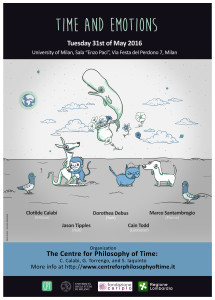Time and Emotions
Tuesday 31st of May 2016
University of Milan, Sala “Enzo Paci”, Via Festa del Perdono 7, Milan
—-
—–
Programme
10:00 – 11:30 Clotilde Calabi (Milano) and Marco Santambrogio (Parma) – “Russell in Love. Emotions, Beliefs, and other Propositional Attitudes”
11:30 – 11:45 Coffee break
11:45 – 13:15 Dorothea Debus (York) – “Affective Mental Time Travel: On the Nature of Future-Directed Emotions”
—
13:15 – 14:30 Lunch
—
14:30 – 16:00 Jason Tipples (Hull) — “Does Emotion Speed or Slow our Internal Clock?”
16:00 – 16:15 Coffee break
16:15 – 17:45 Cain Todd (Lancaster) – “Emotional Distortions of Temporal Experience”
—————-
Abstracts
Clotilde Calabi (Milano) and Marco Santambrogio (Parma) – Russell in Love. Emotions, Beliefs, and other Propositional Attitudes
Abstract: If you know that Hesperus is Phosphorus and you also happen to believe that Hesperus is shining, then you cannot believe that Phosphorus is not shining. More generally, a rational subject S cannot, at the same time, both believe that p and disbelieve that p – i.e., believe that not-p – under two distinct modes of presentation that S knows are modes of presentation of the same thing. Let us call it Frege’s Constraint. Parallel constraints hold for some other propositional attitudes, such as judging and imagining, but not for all. One can be pleased, e.g., that one is going to win a given competition. One knows that his/her winning is the same as all others not winning, i.e., losing. Still, one might not be pleased that all others lose. Fear is another case in point, as one might fear that Ricky Gervais will mention him/her at the Emmy Award opening and also fear that he will not mention her. Now, which attitudes obey Frege’s Constraint? How are rationality and cognition involved in it? Do emotions invariably fail to obey, or does it make a difference that an emotional attitude is future-oriented, rather than past-oriented?
—
Dorothea Debus (York) – Affective Mental Time Travel: On the Nature of Future-Directed Emotions
Abstract: This paper aims to contribute to an understanding of our ability to ‘travel affectively in time’, that is, our ability to experience emotions which are directed at past or future events. More specifically, I here focus on future-directed affective mental time travel, and I ask how we might account for the nature of future-directed emotions.
—
Jason Tipples (Hull) – Does Emotion Speed or Slow our Internal Clock?
Abstract: We know that emotion distorts the perception of brief (<2 seconds) intervals but we are not sure why. One idea is that emotion affects a dedicated timer or internal clock. I will review neural and behavioural evidence for this idea and then present an alternative to the clock model. I will also consider whether temporal distortions reflect specialised emotion processes – to what extent are they fear/threat/danger specific?
—
Cain Todd (Lancaster) – Emotional Distortions of Temporal Experience
Abstract: Although familiar anecdotally, emotional distortions of temporal experience (e.g. ‘time seems to slow down during a traumatic episode of fear/stress’) have been little studied either by psychologists or philosophers. Looking at recent psychological and philosophical explanations of the phenomena, due primarily to the work of Sylvie Droit-Volet and Ian Phillips, I argue that the nature of emotional experiences and their connection to attention poses problems for these accounts. I then examine some implications for thinking about both the nature of emotional experiences and the nature of temporal perception.
